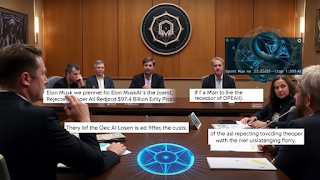Open AI Rejects Elon Musk’s $97.4 Billion Bid:
Open AI Rejects Elon Musk’s $97.4 Billion Bid:
Introduction
OpenAI: Origins, Mission, and Evolution
OpenAI was established in 2015. by Elon Musk, Sam Altman, Greg Brockman, and other prominent figures with the express objective of developing AI systems that would benefit all of humanity. Initially structured as a nonprofit, OpenAI sought to function as an independent research entity committed to counteracting the monopolization of AI technology by a handful of corporate interests. However, as the computational and financial demands of cutting-edge AI research escalated, OpenAI transitioned into a capped-profit model—an unprecedented hybrid structure designed to attract investment while ensuring that profit motives did not override ethical considerations.
Octal factor in OpenAI’s current operational structure is its strategic alliance with Microsoft. , which has injected significant capital into the company, thus affording OpenAI the financial resources necessary to sustain its intensive research endeavors. While this partnership has facilitated unprecedented advancements—exemplified by models such as ChatGPT —it has also invited scrutiny regarding OpenAI’s adherence to its foundational ethos of accessibility and equitable AI development.
Elon Musk’s Motivations Behind the $97.4 Billion Offer
Musk’s bid to acquire OpenAI was not merely a financial maneuver but rather a calculated strategic initiative driven by multiple intersecting imperatives:
1. Perceived Deviation from OpenAI’s Core Mission
Musk has been an outspoken critic of OpenAI’s pivot toward commercial partnerships, particularly its entanglement with Microsoft. He contends that OpenAI’s increasing prioritization of proprietary models and monetization strategies represents a fundamental betrayal of its original mission. Musk has publicly expressed concerns that OpenAI is evolving into precisely the kind of corporate-controlled AI entity that it was designed to counteract.
2. Competitive Positioning in the AI Arms Race
Musk’s decision to establish xAI , an AI enterprise intended to rival OpenAI, underscores his commitment to fostering AI systems that align with his philosophy of transparency and ethical alignment. Given OpenAI’s indisputable technological lead, acquiring the organization would have significantly accelerated Musk’s AI ambitions, thereby granting him direct access to cutting-edge language models and research trajectories.
3. Ensuring AI Safety and Ethical Development
Musk has long articulated concerns regarding the existential risks posed by AI, warning that unregulated AI proliferation could have catastrophic consequences for humanity. By exerting direct control over OpenAI, Musk sought to impose stringent safety protocols that would align AI development with long-term human welfare and existential security.
Why OpenAI Rejected Musk’s Bid
The outright dismissal of Musk’s acquisition proposal was predicated on a confluence of ethical, operational, and governance considerations. Several key factors played a pivotal role in OpenAI’s decision:
1. Preservation of Institutional Autonomy
A core tenet of OpenAI’s governance model is its commitment to maintaining independence from individual or corporate control. Accepting Musk’s bid would have concentrated decision-making power within a single entity, thus fundamentally contradicting OpenAI’s structural design, which seeks to prevent monopolization and ensure AI benefits are equitably distributed.
2. Commitment to Multi-Stakeholder Ethical AI Development
The OpenAI board has consistently emphasized its dedication to ensuring AI’s broad-based societal benefits. Musk’s acquisition could have reoriented OpenAI’s research priorities toward his personal vision, thereby diminishing the influence of diverse stakeholders who contribute to the ethical and technical discourse surrounding AI development.
3. Legal and Structural Constraints
OpenAI’s hybrid structure—which incorporates both a nonprofit oversight entity and a capped-profit subsidiary—introduces legal complexities that would have made an outright acquisition exceedingly difficult. Transforming OpenAI into a wholly Musk-controlled private enterprise would have necessitated extensive legal restructuring, likely triggering regulatory scrutiny from antitrust bodies and governmental oversight agencies.
4. Historical Friction Between Musk and OpenAI Leadership
Musk’s departure from OpenAI in 2018 was reportedly catalyzed by fundamental disagreements regarding the organization’s strategic direction. Given this history, tensions between Musk and OpenAI’s existing leadership likely played a significant role in the board’s rejection of his proposal. Institutional memory of past conflicts would have raised concerns regarding governance stability under Musk’s leadership.
Implications for the Future of AI
The fallout from OpenAI’s rejection of Musk’s bid has far-reaching consequences for AI governance, competition, and public trust:
1. Escalation of the AI Ownership Debate
The dispute underscores the increasingly contentious debate over AI governance: should AI development be controlled by open-source, public-interest organizations, or is the private sector better equipped to drive technological advancement? This discourse will likely shape future AI policy and regulatory interventions.
2. Intensification of Market Competition
Musk’s rejection may precipitate an acceleration in Xai’s development trajectory, leading to heightened competition between OpenAI and Musk’s alternative AI initiatives. Moreover, industry giants such as Google DeepMind, Microsoft, Anthropic, and Meta AI. will likely leverage this moment to further entrench their positions in the AI ecosystem.
3. Regulatory and Ethical Considerations
As AI technologies continue to permeate diverse sectors, policymakers worldwide are grappling with the challenge of regulatory oversight. OpenAI’s decision may embolden regulators to introduce stricter guidelines ensuring that AI development remains aligned with public interest objectives rather than private monopolization.
4. Potential for Further Legal Disputes
Given Musk’s history of challenging corporate decisions through litigation, it is conceivable that he may pursue legal avenues to contest OpenAI’s governance or strategic direction. If such legal action materializes, it could set a precedent for AI-related corporate governance disputes.
Conclusion
OpenAI’s resolute refusal of Musk’s $97.4 billion offer reaffirms its commitment to ethical AI development, institutional independence, and multi-stakeholder governance. However, this decision also raises pressing questions regarding the future trajectory of AI governance, the role of corporate interests in AI innovation, and the mechanisms necessary to safeguard AI’s alignment with public good objectives.
As AI continues to redefine global economies, workforce dynamics, and sociopolitical structures, the central challenge remains how to balance innovation, ethical stewardship, and equitable access to AI’s transformative capabilities. This pivotal moment in AI history will undoubtedly influence the strategic direction of both OpenAI and its competitors, shaping the technological landscape for years to come.


Comments
Post a Comment